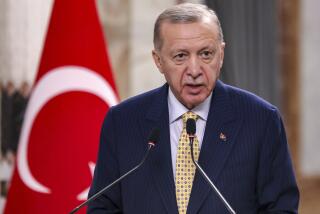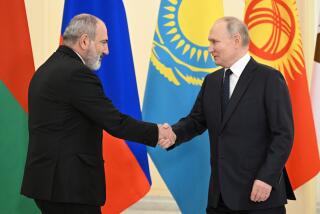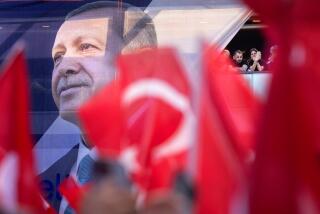Turkey Takes Lead in Black Sea Pact : Commerce: Russia and former Communist allies join host nation in pledge of economic cooperation.
- Share via
ISTANBUL, Turkey — Once the humble guardian of NATO’s remote southeastern flank but now a newly confident power, Turkey has stepped up to help Russia and its former Communist allies rebuild a sense of common purpose among the splintering states and nations of the Black Sea.
Indeed, Armenians and Turks, Muslims and Christians, Slavs and Caucasians gathered this week at Ankara’s invitation to create the Black Sea Economic Cooperation Region, a group made up of Turkey, Russia, Ukraine, Moldova, Romania, Bulgaria, Georgia, Armenia and Azerbaijan.
“Regional concepts, rather than national strategies, have become the focal point of international attention,” delegates were told Monday by Turkish President Turgut Ozal. “The emergence of commonly shared values such as democracy, human rights and free enterprise creates favorable conditions for new forms of economic partnership.”
Ozal launched the Black Sea zone idea two years ago, partly to give Turkey a new outlet after the rebuff of its 1987 application to join the European Community and partly to take advantage of the collapse of Soviet power in an area that the Turks once dominated as the Ottoman Empire.
The Black Sea was virtually a Turkish lake for three centuries until the early 1800s, and it was with some pride that delegates were taken sightseeing to the Topkapi palace, seat of the Ottoman Empire overlooking the Bosporus Strait between Europe and Asia.
“The main thing is that this is the first time in 50 years that a Turkish idea and Turkish leadership has led to the formation of an international group,” said Oktay Eksi, chief commentator of the nationalist daily newspaper Hurriyet.
But Turkish Foreign Minister Hikmet Cetin stressed that the new group, whose heads of state will sign a formal accord sometime between June 20 and July 17, will be one of equal partners.
“We have no hegemonic policy, no policy of encroachment. In fact, we are worried that we cannot meet the expectations made of us,” said Ozdem Sanberk, undersecretary at the Turkish Foreign Ministry. “We want to cooperate; we are looking for stability, East and West.”
Under pressure from former Soviet republics wanting to preserve their new independence, Turkey has diluted its original plans for a strong institutional framework for the Black Sea group. And to appease Brussels, Monday’s declaration made clear that Turkey does not intend to give the eight former Communist nations more favorable customs tariffs than those offered to the EC.
Participants also offered places in the group to former Yugoslav republics and even EC-member Greece, long a rival of Turkey that has deliberately disrupted Ankara’s relations with the European Community in Brussels because of disputes over Cyprus and the Aegean.
Monday’s 18-point joint declaration contained no concrete commitments. It envisages common efforts on regional economies; lowering customs tariffs when possible; improving communications; easing visa restrictions; speeding capital flow; coordinating environmental measures, and founding a Black Sea foreign trade and investment bank.
The Georgian republic’s envoy said he thinks the new zone is more important to his country than the Commonwealth of Independent States, which replaced the Soviet Union. Representatives of Russia and the Ukraine were enthusiastic.
While the Azerbaijani foreign minister was clearly at home among his fellow Turkish speakers, the Armenian delegation was more cautious.
“Armenia is trying to take part in all constructive processes. We are ready to join” the Black Sea group, said Vahan Papazyan, an adviser to the Armenian president. “But the level of economic development in these states is so uneven, it’s hard to see how it will grow.”
Western diplomats are also skeptical that such an odd collection of religions and races from the Balkans to the Caucasus can succeed. But they say it is part of a regional shift of influence toward Turkey, with 57 million people and a relatively robust economy whose liberalization started a decade ago.
The mixture of Christians and Muslims in the new Black Sea group is also part of Turkey’s policy to try to bridge the gap between the two religions. Muslim Turkey fears being left on the wrong side of what it thinks may be an emerging Islamic-Christian fault line across Asia.
Washington’s decision to open an embassy in the Armenian capital of Yerevan, while granting only provisional recognition to Azerbaijan, is a dangerous precedent that could alienate Muslims, Turkish diplomats maintain.
Ankara also wants to help channel Western emergency aid to the former Soviet Muslim-Turkic republics of Central Asia, which have been beating a path to its door with requests for help in a transition to the Western culture of the secular, Turkish model, rather than that of Islamic fundamentalist Iran.
More to Read
Sign up for Essential California
The most important California stories and recommendations in your inbox every morning.
You may occasionally receive promotional content from the Los Angeles Times.













